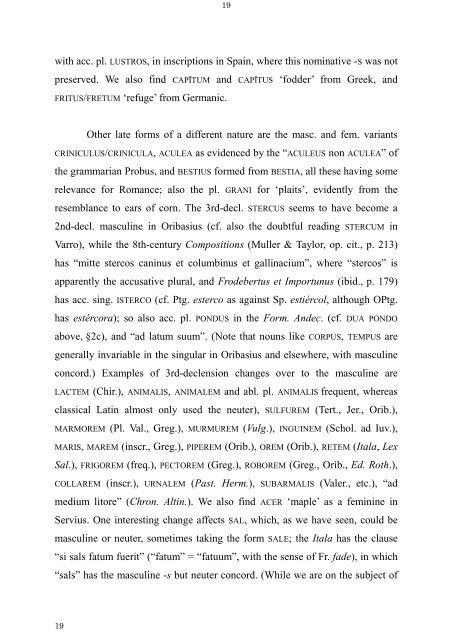The Latin Neuter Plurals in Romance - Page ON
The Latin Neuter Plurals in Romance - Page ON
The Latin Neuter Plurals in Romance - Page ON
You also want an ePaper? Increase the reach of your titles
YUMPU automatically turns print PDFs into web optimized ePapers that Google loves.
19<br />
19<br />
with acc. pl. LUSTROS, <strong>in</strong> <strong>in</strong>scriptions <strong>in</strong> Spa<strong>in</strong>, where this nom<strong>in</strong>ative -S was not<br />
preserved. We also f<strong>in</strong>d CAPĪTUM and CAPĪTUS ‘fodder’ from Greek, and<br />
FRITUS/FRETUM ‘refuge’ from Germanic.<br />
Other late forms of a different nature are the masc. and fem. variants<br />
CRINICULUS/CRINICULA, ACULEA as evidenced by the “ACULEUS non ACULEA” of<br />
the grammarian Probus, and BESTIUS formed from BESTIA, all these hav<strong>in</strong>g some<br />
relevance for <strong>Romance</strong>; also the pl. GRANI for ‘plaits’, evidently from the<br />
resemblance to ears of corn. <strong>The</strong> 3rd-decl. STERCUS seems to have become a<br />
2nd-decl. mascul<strong>in</strong>e <strong>in</strong> Oribasius (cf. also the doubtful read<strong>in</strong>g STERCUM <strong>in</strong><br />
Varro), while the 8th-century Compositions (Muller & Taylor, op. cit., p. 213)<br />
has “mitte stercos can<strong>in</strong>us et columb<strong>in</strong>us et gall<strong>in</strong>acium”, where “stercos” is<br />
apparently the accusative plural, and Frodebertus et Importunus (ibid., p. 179)<br />
has acc. s<strong>in</strong>g. ISTERCO (cf. Ptg. esterco as aga<strong>in</strong>st Sp. estiércol, although OPtg.<br />
has estércora); so also acc. pl. P<strong>ON</strong>DUS <strong>in</strong> the Form. Andec. (cf. DUA P<strong>ON</strong>DO<br />
above, §2c), and “ad latum suum”. (Note that nouns like CORPUS, TEMPUS are<br />
generally <strong>in</strong>variable <strong>in</strong> the s<strong>in</strong>gular <strong>in</strong> Oribasius and elsewhere, with mascul<strong>in</strong>e<br />
concord.) Examples of 3rd-declension changes over to the mascul<strong>in</strong>e are<br />
LACTEM (Chir.), ANIMALIS, ANIMALEM and abl. pl. ANIMALIS frequent, whereas<br />
classical <strong>Lat<strong>in</strong></strong> almost only used the neuter), SULFUREM (Tert., Jer., Orib.),<br />
MARMOREM (Pl. Val., Greg.), MURMUREM (Vulg.), INGUINEM (Schol. ad Iuv.),<br />
MARIS, MAREM (<strong>in</strong>scr., Greg.), PIPEREM (Orib.), OREM (Orib.), RETEM (Itala, Lex<br />
Sal.), FRIGOREM (freq.), PECTOREM (Greg.), ROBOREM (Greg., Orib., Ed. Roth.),<br />
COLLAREM (<strong>in</strong>scr.), URNALEM (Past. Herm.), SUBARMALIS (Valer., etc.), “ad<br />
medium litore” (Chron. Alt<strong>in</strong>.). We also f<strong>in</strong>d ACER ‘maple’ as a fem<strong>in</strong><strong>in</strong>e <strong>in</strong><br />
Servius. One <strong>in</strong>terest<strong>in</strong>g change affects SAL, which, as we have seen, could be<br />
mascul<strong>in</strong>e or neuter, sometimes tak<strong>in</strong>g the form SALE; the Itala has the clause<br />
“si sals fatum fuerit” (“fatum” = “fatuum”, with the sense of Fr. fade), <strong>in</strong> which<br />
“sals” has the mascul<strong>in</strong>e -s but neuter concord. (While we are on the subject of









